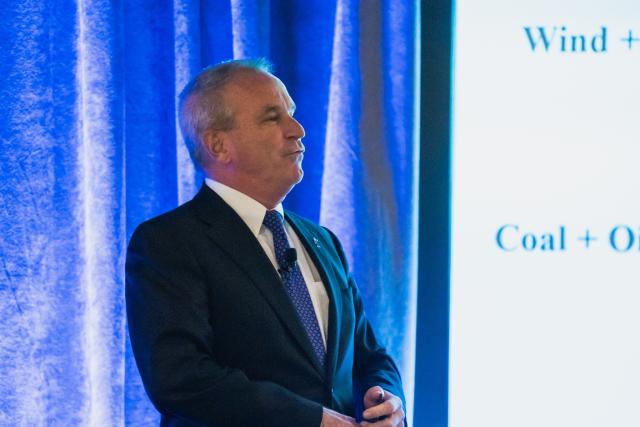
Robert Bryce, author, film producer and Power Hungry podcast host. (Source: Hart Energy)
Natural gas and nuclear power are the best energy sources for the future and the Biden administration is dangerously adverse to hydrocarbons, according to an industry pundit and author.
Robert Bryce, who is also a film producer and host of the Power Hungry podcast, said increased investments in renewable energy have not led to decreases in the use of fossil fuels.
“There is no evidence that there is, in fact, an energy transition underway,” Bryce said at Hart Energy’s America’s Natural Gas Conference on Sept. 27.
Between 2004 and 2022, he said, investments of $4.1 trillion increased wind and solar capacity by 32 exajoules (EJ). That expansion gave it a 5% share in the energy mix in 2022. Last year, overall total energy use was 604 EJ, of which hydrocarbons provided 494 EJ, or 82% of the mix while hydro, nuclear and biomass provided 13% of the mix, he said, citing a statistical review by BloombergNEF.
Natural gas use, according to the review, grew 5% in 2022 from 2021, he noted.
“Where is the evidence of the energy transition? It doesn't show up in the numbers despite staggering amounts of investment,” he said.
And the focus on renewable energy is detrimental to the oil and gas industry, he said.
“The gas industry is squarely in the crosshairs” of proposed regulations focused on furthering the cause of renewable energy, he said.
The goal seems to be to “electrify everything,” he added.
“We're going to eliminate coal, oil and natural gas, and we're going to run the world on renewables? No, they won't. We live in a world that is a network of networks, a lot of interconnected networks that remarkably work together,” he said.
Finding locations for new renewable energy sources has proven to be problematic, he said.
“This battle with the siting and of land use in rural America is about rural versus urban. It's also about Republican versus Democrat. Democrats who live in the cities like the idea of renewables. They don't want to live next to them, but they want to put them out there in flyover country, out there in Trump land, because they don't have to live with them,” Bryce said.
Residential natural gas demand has held steady at 5 Tcf/year for five decades, he said.
It “has not changed, despite the fact that the U.S. has added about 110 million people in that 50-year period,” Bryce said.
According to Department of Energy (DOE) numbers from August 2023, average unit costs of energy for five residential energy sources range from $14/MMBtu for natural gas up to $46/MMBtu for electricity, he said.
Despite this disparity in costs, many are pushing an “electrify everything” agenda banning the use of natural gas in new residential construction, he said.
Prohibiting the use of natural gas for residential uses, he said, is effectively a tax on lower-income households.
“I'm enough of a liberal to believe we should not be taxing the poor more than we're taxing the rich and yet, this ban on natural gas is in fact an energy tax on the poor and the middle class,” he said.
Bryce also noted the wealthy are primarily buyers of electric vehicles (EVs), which last year cost an average $66,000 per car.
“Who buys Teslas? It’s the [Mercedes] Benz and Beamer [BMW] crowd. It’s not the working class,” he said.
He said gasoline and diesel fuel are more effective energy sources.
“Why do we use gasoline and diesel fuel? Basic physics. The energy density is 40 times that of the best lithium ion batteries,” Bryce said. “The gravimetric energy density of gasoline and diesel fuel are unbelievable. If oil didn't exist, we would have to invent it.”
Even with the increasing number of EVs on the road, he believes the need for gasoline will continue, due to the Lindy effect, which theorizes that the longer something is in place, the longer it's likely to continue.
U.S. gasoline consumption has been 9 MMbbl/d for over 30 years according to EIA data, he said, and there are 284 million motor vehicles in the country.
“Gasoline is not going away,” he said.
The way forward, he said, needs to include both natural gas and nuclear, which will help lower emissions.
Nuclear energy requires much less land than wind or solar, he noted, but the technology is mature and scalable while providing high power density. Nuclear power, which “gets no love,” must overcome the perception challenge, he added
Natural gas is a better energy source than coal, which has too much carbon, and natural gas resources are “enormous,” he said.
“We have more gas in the U.S. than we could say grace over, and we need to develop it. But we're getting no help from this administration,” he said.
The Biden administration is “the most anti hydrocarbon administration in American history. And there's no second place, and your industry is directly in the crosshairs,” Bryce said. “The regulatory situation is completely stacked against the hydrocarbon sector. There are effectively no pro hydrocarbon voices in the Biden administration. It's all renewables, all climate activists. And I think it's a deeply dangerous situation.”
Recommended Reading
Phillips 66’s NGL Focus, Midstream Acquisitions Pay Off in 2024
2025-02-04 - Phillips 66 reported record volumes for 2024 as it advances a wellhead-to-market strategy within its midstream business.
Dividends Declared Week of Jan. 13
2025-01-17 - With 2024 year-end earnings season underway, here is a compilation of dividends declared from select upstream, midstream and downstream companies.
Michael Hillebrand Appointed Chairman of IPAA
2025-01-28 - Oil and gas executive Michael Hillebrand has been appointed chairman of the Independent Petroleum Association of America’s board of directors for a two-year term.
Pinnacle Midstream Execs Form Energy Spectrum-Backed Renegade
2025-02-03 - Renegade Infrastructure, led by Permian-centric Pinnacle Midstream developers Drew Ward and Jason Tanous, have received a capital commitment from Energy Spectrum Partners.
Not Sweating DeepSeek: Exxon, Chevron Plow Ahead on Data Center Power
2025-02-02 - The launch of the energy-efficient DeepSeek chatbot roiled tech and power markets in late January. But supermajors Exxon Mobil and Chevron continue to field intense demand for data-center power supply, driven by AI technology customers.
Comments
Add new comment
This conversation is moderated according to Hart Energy community rules. Please read the rules before joining the discussion. If you’re experiencing any technical problems, please contact our customer care team.






